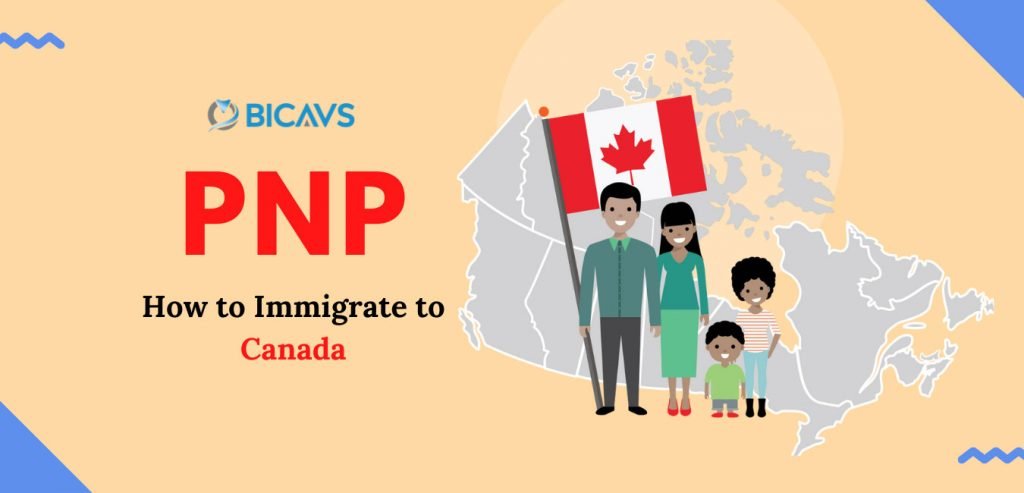This complete Canada visa page provides you with everything you need to know about the Provincial Nominee Program. Launched in 1998, the Provincial Nominee Program (PNP) is the second leading way to immigrate to Canada as a skilled worker after Express Entry. Nearly every province and territory operate the PNP to welcome skilled workers from all over the world to help strengthen their economies. Scroll down to learn more about the PNP.
Overview
Under Canada’s Constitution, the federal government and each province and territory share the authority to manage the country’s immigration system.
As such, the Provincial Nominee Program (PNP) allows Canadian provinces and territories to nominate individuals who wish to immigrate to Canada and who are interested in settling in a particular province. The only exceptions are the Northern Canada territory of Nunavut and Quebec. Instead, the province of Quebec has the authority to establish its selection criteria for economic immigration.
The main purpose of the PNP is to spread the benefits of immigration across Canada. Before the launch of the PNP in 1998, most of Canada’s immigrants settled in Ontario, Quebec, and British Columbia. Since 1998, however, Canada has seen a broader distribution of immigration across the country since the Prairie provinces (Alberta, Saskatchewan, and Manitoba) and Atlantic provinces (New Brunswick, Nova Scotia, Prince Edward Island, and Newfoundland and Labrador) have enjoyed more success attracting immigrants thanks in large part to the PNP.
Each PNP has at least one immigration stream that is aligned with the federal Express Entry immigration selection system. Provincial nominations issued under these Express Entry-aligned streams are known as ‘enhanced nominations’. The benefits of enhanced PNP streams are that they award Express Entry candidates an additional 600 Comprehensive Ranking System (CRS) points, which essentially guarantee they will receive a permanent residence invitation under Express Entry. Another major benefit is they can have their permanent residence application processed by the federal government quicker, typically within six months. The other way to obtain permanent residence through the PNP is under a ‘base’ stream. Here, you apply to a PNP stream directly and once you obtain a provincial nomination, the federal government will process your permanent residence application.
Which PNP Streams Am I Eligible For?
With more than 80 provincial immigration streams, discovering the Canadian immigration pathway that best suits you may be challenging. Here are some ongoing PNP streams which might right for you. See our blogs to know more details about individual PNP streams.
Alberta Immigrant Nominee Program (AINP)
Alberta’s provincial immigration program consists of three streams: The Alberta Opportunity Stream, the Alberta Express Entry Stream, and the Self-Employed Farmer Stream. The province issues provincial nominations to foreign nationals who meet program-specific criteria and demonstrate an intention to reside in the prairie province.
British Columbia Provincial Nominee Program (BC PNP)
The BC PNP consists of the Skills Immigration, Express Entry BC and Entrepreneur Immigration Streams. These streams are divided into categories that target skilled workers, international graduates and other professionals with skills, experience and qualifications needed in B.C.
Manitoba Provincial Nominee Program (MPNP)
Manitoba’s provincial immigration program is comprised of streams designed to nominate skilled workers and their families who wish to work and live in the province permanently. The MPNP is currently undergoing renewal.
New Brunswick Provincial Nominee Program (NBPNP)
The NBPNP is New Brunswick’s provincial immigration program with streams targeting entrepreneurs, international graduates, skilled workers with employer support and skilled workers in the federal government’s Express Entry selection system
Newfoundland and Labrador Provincial Nominee Program (NLPNP)
The NLPNP accepts immigration applications from skilled workers, international graduates and entrepreneurs who meet program-specific criteria such as a job or job offer, intent to reside, and the ability to become economically established in the province.
Nova Scotia Nominee Program (NSNP)
The NSNP is Nova Scotia’s program for the nomination of eligible skilled workers, international graduates, entrepreneurs and professionals looking to settle permanently in the province. The program has various economic immigration streams with not one, but three streams aligned with Canada’s Express Entry system.
Ontario Immigrant Nominee Program (OINP)
Through the OINP, Ontario nominates foreign workers, international students, business owners or entrepreneurs who have the skills, experience, education and intent to settle in the province as permanent residents.
Prince Edward Island Provincial Nominee Program (PEI PNP)
The PEI PNP is the island province’s economic immigration program for skilled workers, international graduates, entrepreneurs who demonstrate the intention to live and work in PEI and show the ability to become economically established in the province.
Saskatchewan Immigrant Nominee Program (SINP)
The SINP is Saskatchewan’s dedicated immigration program for the selection and nomination of eligible foreign nationals through various pathways, including its leading International Skilled Worker: Express Entry and Occupation In-Demand categories.
Northwest Territories Nominee Program (NTNP)
The Northwest Territories accepts economic immigration applications to settle in Northern Canada under two main streams – the Employer Driven and Business – one of which has three distinct streams, including an Express Entry-aligned stream for skilled workers.
Yukon Nominee Program (YNP)
Yukon’s official provincial immigration program assists eligible employers in Canada’s northern territory to nominate internationally-trained foreign workers and businesspeople for Canadian permanent residence.
Frequently Asked Questions
1. Do PNP immigrants find good jobs in Canada?
Yes. Research by Immigration, Refugees and Citizenship Canada (IRCC), Statistics Canada, Canada’s provinces and territories, and academics show that immigrants who arrive through the Provincial Nominee Program (PNP) have strong labour market outcomes. They are often able to integrate quickly into the Canadian job market. The research shows that PNP immigrants tend to earn high wages, have high rates of labour force participation and employment, and low rates of unemployment.
Reasons for the success of PNP immigrants include:
- PNP immigrants are nominated based on meeting the local labour market needs of Canada’s provinces and territories.
- They have high levels of human capital including strong language skills, education, work experience, and Canadian connections.
- PNP selection criteria often screen for Canadian work experience, Canadian education, and pre-arranged employment in Canada.
3. Do I need a job offer or do I need to study in Canada to obtain a provincial nomination?
No. Various PNP streams do not require a job offer or Canadian work or study experience for candidates to be eligible to successfully receive a nomination.
4. Why does Canada have the PNP?
The purpose of the PNP is to promote economic growth across Canada.
Canada’s Constitution states that immigration is an area of shared federal-provincial jurisdiction, with the federal government having the final say on immigration matters.
For much of Canada’s history, the federal government managed the immigration system with little involvement from the provinces and territories.
Beginning in the 1960s, the francophone province of Quebec requested more authority from the federal government to select immigrants so that it could help to strengthen its francophone character. Today, Quebec has the most authority among all of Canada’s provinces and territories in terms of selecting and settling immigrants.
In 1998, the federal government and provinces agreed to launch the Provincial Nominee Program (PNP). The purpose was to help smaller provinces attract immigrants who up until that point mainly went to Ontario, Quebec, and British Columbia. These smaller provinces wanted a dedicated program to enable them to create selection criteria and recruit economic class skilled immigrants that met their labour market needs.
The PNP has since expanded and operates in every Canadian province and territory except Quebec and Nunavut. It is widely regarded as a success and is seen as a key driver of economic growth across the country since the arrival of PNP immigrants supports employment, investment, entrepreneurship, and spending.
5. Can I apply to Express Entry and a PNP at the same time?
Yes. You can submit an Express Entry profile and also apply directly to a PNP stream at the same time.
One of the benefits of entering the Express Entry pool is you make yourself visible to provinces and territories who can review your profile and decide to provide you with an invitation to apply to their PNP. If you accept their invitation, you would submit a completed PNP application to the province or territory. Once your application is approved, you will receive a nomination certificate which will provide you with an additional 600 Comprehensive Ranking System (CRS) points under Express Entry, and virtually guarantee you will receive an invitation to apply for permanent residence under Express Entry.
6. Which PNP stream is the easiest?
Each candidate’s circumstances are different. You should conduct your research or reach out to an immigration lawyer to identify which PNP options may be most suitable for your situation.
7. How many immigrants do Canada welcome through the PNP each year?
Canada seeks to welcome over 80,000 immigrants through the PNP each year.
8. Can my family come to Canada with me if I obtain a provincial nomination?
Yes, close family members can move to Canada with you and also obtain permanent residence.
Close family members include:
- your spouse or common-law partner
- dependent children
- dependent children of your spouse or common-law partner
- dependent children of dependent children
Dependent children are:
- under 22 years old and not a spouse or common-law partner
- 22 years of age or older, depended significantly on financial support from their parents before the age of 22 and can not support themselves financially due to a physical or mental condition
9. Which provinces in Canada have the most jobs?
Canada is a diverse economy with many job opportunities in each province and territory. It is recommended that you research to identify job opportunities that meet your professional background and career goals. Each PNP stream is also designed to provide skilled worker candidates with the best opportunity to succeed in the province or territory. This is because PNP streams are each set up to identify candidates who have professional backgrounds and skills that are in high demand in the province or territory.
10. How can I learn more about the PNP?
IRCC’s website contains more information on the PNP.
11. Can I move to another province after immigrating to Canada through the PNP?
Canada’s Constitution allows Canadian citizens and permanent residents to move freely within the country. You are allowed to move to another province if you obtained permanent residence through the PNP, however, you are strongly encouraged to be honest about your residency intentions when submitting your PNP application. Misrepresenting your intentions is a serious offence and can lead to consequences for you. It is best to pursue a PNP stream in a province or territory that you believe meets your professional and personal needs.
Some PNP streams will provide a candidate with a work permit. Once the candidate has met certain criteria, the province or territory may issue a nomination certificate to the candidate so they can apply for permanent residence. In such cases, you need to reside in that province or territory while you hold a work permit to meet the conditions to get a provincial nomination.
12. What are the language requirements for the PNP?
Each PNP stream has its language standards. You will need to complete one of the following officially designated language tests. Your language test results are valid for two years:
English
- CELPIP General
- IELTS General Training
French
- TEF Canada: Test d’évaluation de français
- TCF Canada : Test de connaissance du français








